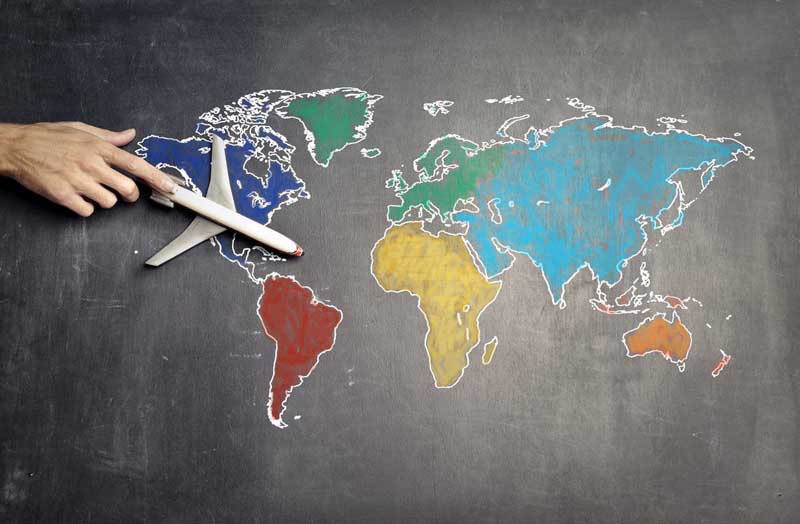Two focuses of my blog are Financial Literacy/Money and Business/Entrepreneurship. Depending upon the type of business that you have, you may start it domestically. Depending upon your sector, you may be able to expand into other countries. The following guest post is entitled, Helping Businesses Expand into the International Market.
* * *

• Plan effectively with detailed market analysis and a strong understanding of export methods.
• Conduct thorough market research, including competitor analysis, to understand the international market.
• Establish a robust digital presence through an engaging website, social media marketing, and SEO.
• Network extensively, seek advice, and partner with experts for valuable insights and support in global expansion.
• Create valuable connections to ensure potential customers can find you and understand the brand message.
A business expansion into the international market is always an exciting prospect, presenting immense opportunities for growth and profit. Still, it can be daunting for any organization, especially for a small and medium-sized enterprise (SME) in Singapore.
However, with the right approach, planning, and support, businesses can successfully expand their reach in the global market. If you want to expand your business globally, read on to find out how to take your business into the international market.

Develop a Solid Export Plan
Before you embark on any business expansion journey, it is crucial to have a clear plan to work on. Developing an export plan helps you identify what you want, how to achieve it, and what resources you need.
Detailed Market Analysis
The plan should include a detailed market analysis, set goals, exporting methods, marketing strategies, and funding sources. You can seek the help of a business consultant or an export specialist to help you develop a comprehensive export plan.
To get the data you need for analyzing the market, you can work with a company providing data through a reliable hyperscale data centre. The data will allow your business to understand trends and how to position your products in the global market.
Conduct Market Research
When expanding your business into a new international marketplace, it is essential to conduct thorough market research to understand the market demand, customer behavior, competition, culture, regulations, and laws.
Research Firm
You can hire a local marketing research firm to conduct market research or use online resources to gather information about the market. This information will help you to adapt your products or services to meet the international market’s needs, preferences, and standards.
Competitor Analysis
Analyzing your competitors is also essential when entering a new market. Knowing their products, pricing, and strategies will help you create an edge in the market. A strong understanding of the competition will enable you to differentiate yourself from them and plan for successful growth.
Have a Strong Digital Presence
A strong digital presence is essential in today’s global market. A website serves as your business’s online shop front, and it is crucial to have a well-designed and engaging website that can communicate your brand message and values.
Social Media Marketing
Additionally, social media offers a cost-effective way of reaching potential clients globally. Identify social media platforms widely used in your target market and develop a strategy to engage your audience.
Search Engine Optimization (SEO)
Having a strong online presence also requires optimizing your website for search engines. Using SEO techniques such as keyword research and content optimization, you can ensure that your website is visible to the right people when they search for you online. This ensures that potential customers find out about your business and can connect with you on their own.
Network and Seek Advice
Networking is an essential part of any business growth journey. Joining industry groups, attending conferences, and seeking mentorship from other successful businesses can help you expand your business globally. You will learn from other entrepreneurs’ stories of success and failure, get advice on the best strategies, and create valuable connections to help you penetrate the global market.
Entrepreneurs and Professionals
Belonging to a network of like-minded entrepreneurs and professionals can also be a great source of motivation. Knowing that you have the support of others going through the same struggles as you are will help keep you focused on achieving your global business goals.

Partner with Experts
Partnering with experts can help you navigate growing your business globally. You can work with export consultants, trade and investment agencies, and logistics providers. These experts will provide you with the right connections, advice, and support to help you expand into international markets. You can also consider partnering with other businesses in your industry that have expanded globally to gain insights into the process.
Resources and Guidance
Finding the right partners is essential to ensure you have the resources and guidance required for successful business expansion. To identify potential partners, attend exhibitions and trade fairs in your target market or join international business networks. This will enable you to meet other businesses willing to partner on your global journey.
Expanding your business globally is a journey that requires a lot of planning, effort, and resources. However, it can be a rewarding venture with potential growth and profit. Remember to develop a sound export plan, conduct market research, have a strong digital presence, network, seek advice, and partner with experts. These strategies will help you successfully expand your business globally. Singaporean businesses can take the global market by storm with the right approach and support.





